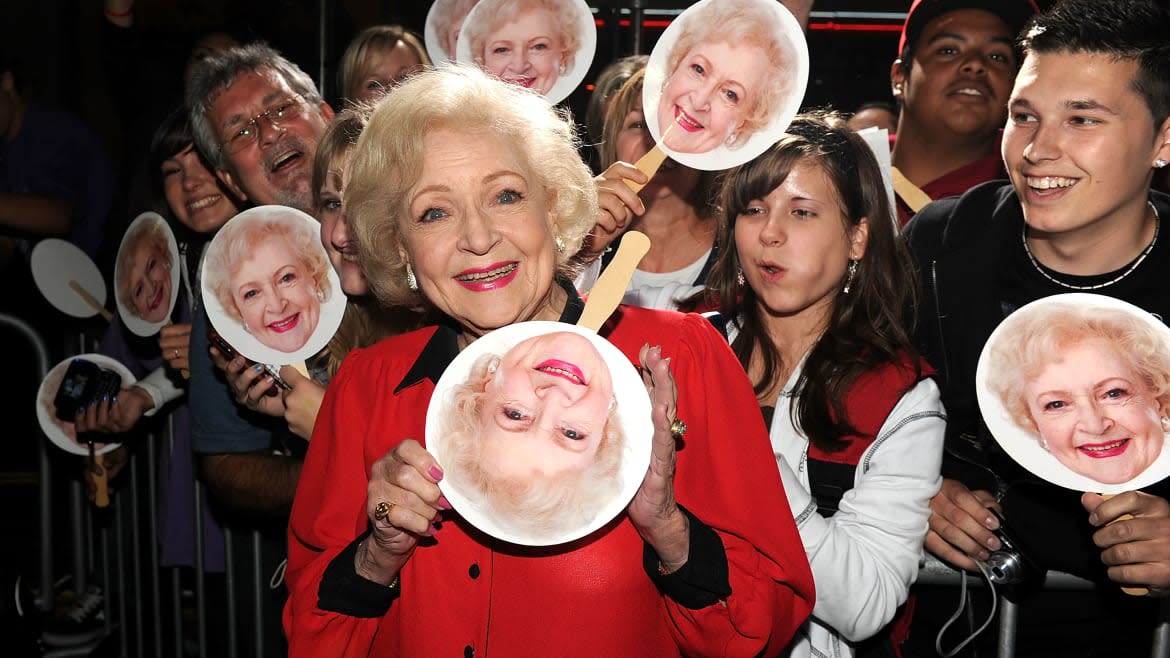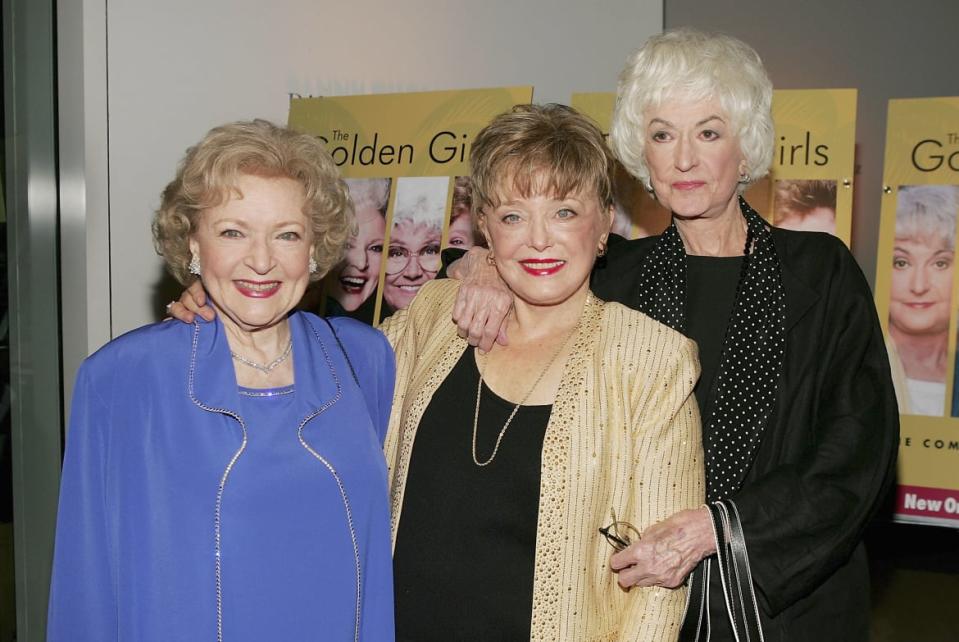What Betty White Meant to Gay Men Like Me

- Oops!Something went wrong.Please try again later.
- Oops!Something went wrong.Please try again later.
- Oops!Something went wrong.Please try again later.
It’s a little known fact that when you received your gay card, it was hand-delivered by Betty White.
Well, let’s say that at least spiritually speaking, it was.
I don’t know specifically why the LGBT community has, for generations, been obsessed with Betty White, other than to say it makes perfect sense and, over the course of a lifetime with the infallible star—how often can multiple generations say that about a cherished entertainer?—she has meant a great deal to many people.
The Great Gay Obsession with Golden Girls has become its own pop culture joke. The bond forged between queer men, Dorothy, Blanche, Rose, and Sophia was folded into the fabric of Looking, HBO’s groundbreaking comedy series about a group of gay friends in San Francisco. On his podcast, RuPaul flaunted an encyclopedic knowledge of the show that is worthy of a dissertation.
There’s a raunchy, withering humor, which could draw fair comparisons to both the Old Hollywood divas and dames that gay men love, but also, of course, drag queens. There was the progressive and, at the time, historic way the sitcom centered episodes on HIV awareness, cross-dressing, and the trauma of coming out to a family member. There is also the idea of chosen family that rings profoundly true to the LGBT community—not to mention the fantasy of living out your years with vibrancy alongside your best friends, having lots of sex, and devouring cheesecake, with no impact on your waistline.
In the moments after it was announced that Betty White had died on New Year’s Eve, I thought about so much more than Golden Girls.
I thought about my grandmother, my aunts, my parents, and my cousins, all of us gathered around watching the series together. I had never seen Nana laugh as hard as she did when Dorothy interrupted one of Rose’s St. Olaf stories with a murderous glare. In turn, I had never laughed so hard.
As I got older, I never stopped watching the show. It was a beautiful surprise to realize that no one else did either. When I arrived at college, the girls down the hall, who would in turn become my best friends, would come to my dorm and we’d watch together, debating who was the Blanche of the group and who was the Rose with more passion than we’ve ever given to the “which Sex and the City character are you?” question.
After I came out and started making real, true gay friends, it was a delightful surprise to arrive at someone’s apartment for pregaming and see that reruns were playing on TV—and then again at the gay bar later that night. And when I found a partner to, at one point, share my life with, I knew it was meant to be when falling asleep while laughing hysterically to Golden Girls was a preferred bedtime ritual, too.
Spending some time today thinking about what all that meant was quite touching. What it meant to be a young, questioning boy and see your grandmother and family laughing at this humor and these stories that seemed to be written just for you and your tastes—and how, maybe, seeing how dear the show was to me might have helped them understand me better, too. That at scary, lonely times of my life, the show wasn’t just an escape or a haven, but the means through which I found community again. My own chosen family.
And then as a journalist lucky enough to have a career covering the TV industry and the impact it has on us all, it’s astonishing to consider Betty White’s role in all of that. There was no one else who accomplished what she did and, because of the way culture is now, there never will be again.
From the Herculean task she had on The Betty White Show in the ’50s—even singing her own commercials—to the delicious Sue Ann Nivens on The Mary Tyler Moore Show to, of course, Rose on Golden Girls and a late-in-life resurgence as a tart-tongued, randy senior in projects like Hot in Cleveland and The Proposal, it’s not just that she was on our TVs, well, forever (essentially, since the TV was around). It’s that she made a point to explode any expectation made of her talent or her “type” (never forget: it was her insistence that she and Rue McClanahan swap roles on Golden Girls so that they weren’t retreading the same old characters they’ve always played) and insisted on making the work matter beyond the screen.
When you’re beloved you have power. She used that power for the animals and for the LGBT community, which matters more than we may take for granted now.
Betty and Joan said reading is fundamental!! pic.twitter.com/CXQdm023bV
— Christian Zamora (@Christian_Zamo) September 9, 2020
At first I was a little startled by the volume of “Kevin, are you handling this OK?!” texts I got from friends and family when TMZ broke the news that White had died, just shy of her 100th birthday. Of course it’s incredibly sad. But also, she was 99 years old, the last surviving member of both the Golden Girls and The Mary Tyler Moore Show casts. For years, we’ve required a daily Twitter trending topic to reassure us that she had not yet passed away. I wouldn’t exactly say it was a surprise.
But then I looked around my one-room apartment and spotted at least five pieces of memorabilia with White’s face on it. It began to make sense why people might have concerns that I’d be unstable in a moment like this, as someone who fills his studio apartment with pictures of Betty White might be unstable to begin with. Yet I’m actually finding this moment rather beautiful—and perfectly Betty.

Actresses Betty White, Rue McClanahan and Bea Arthur arrive for the DVD release party for The Golden Girls on Nov. 18, 2004, in Los Angeles, California.
We’re all getting the opportunity to remember all the reasons why we love our Golden Girl. (Do yourself a favor and pour a nice glass of wine and scroll through all the various scenes from her career people have been posting in tribute. I’ve sprinkled some gems throughout this piece.) But also what a time to go: just weeks before turning 100, after magazines have already published cover stories celebrating the milestone, and on the last day of yet another atrociously bleak year. It’s called comedic timing, sweetie.
And so here I am at the end of 2021 as I was at the start of it, and pretty much every single day in between: emitting a heavy sigh, glancing at the news and muttering “dammit,” and shedding a few tears. But call me Mary Richards at the funeral for Chuckles the Clown: It’s devastating, but I’m laughing through it all, too.
I’m thinking about Betty’s Sue Ann Nivens and what she taught me: When people underestimate or judge you, you deserve to be a bit of a bitch. Maybe, even, that’s what earns you their respect. If nothing else, it makes you indisputably fabulous.
I suspect that’s something that the LGBT community and so many other marginalized people relate to—the passive-aggressive sarcasm you wield as both a weapon and a shield when you’re misunderstood or devalued. Yet there’s confidence in that, too. Brandishing that kind of armor takes inherent talent, intelligence, and sense of humor. It’s a caustic humor that carries pain. Lots of it. But it’s humor nonetheless. In that, at least, there’s joy.
There’s something remarkable about the way that White proved in all of her characters that kindness and sassiness aren’t mutually exclusive. In fact, they’re great, dynamic complements. I have no doubt that gay men love Golden Girls because of how lacerating the insults are. But in that lies the beauty of that show and those characters—and, from us, the desire for what they have.
They mercilessly roast each other because they know each other that well. At a time in their lives when society’s dismissed them—an experience the gay community knows something about—they found people who understand them, flaws and all, better than maybe anyone in their lives had before. The jokes aren’t just funny. They’re gestures of love. It means you’re actually being seen for who you are, completely. Wouldn’t we all be so lucky to have that?
love this moment ❤️ https://t.co/3PDE4fIGCk pic.twitter.com/yj9tvoNIVp
— Frank Costa (@feistyfrank) December 31, 2021
It’s been a blast to see how shrewdly White played with her reputation as America’s Sweetheart in her own golden years.
It’s not just that playing a foul-mouthed or hypersexual senior citizen is, for some reason, always funny, no matter how base-level that stock character might be. It’s that it gave a chance for the legend to prove that, even as a nonagenarian, her comedic timing and her taste remained unparalleled. I still can’t believe I had the opportunity to interview her back in 2011 when she was the It Girl of TV again thanks to Hot in Cleveland. Originally she turned down the project. I asked her why she changed her mind. Without skipping a beat, she deadpanned: “I have the backbone of an eel.”
It’s a great joke because there’s not a lick of truth to it. Read through any of the obituaries published today and learn all the ways she fought for herself, for opportunities for women, and for social causes like gay marriage at a time when none of those things were popular or easy. The thing that’s struck me most of all: You never doubted for a second that she wasn’t having a blast doing it.
It’s dismaying that there really isn’t a torch to pass. The flame goes out with her. Culture is different. TV is different. What we want or expect from our stars is different. That’s why I’m so grateful that we all had this: our lifetimes with Betty White.
Get our top stories in your inbox every day. Sign up now!
Daily Beast Membership: Beast Inside goes deeper on the stories that matter to you. Learn more.

